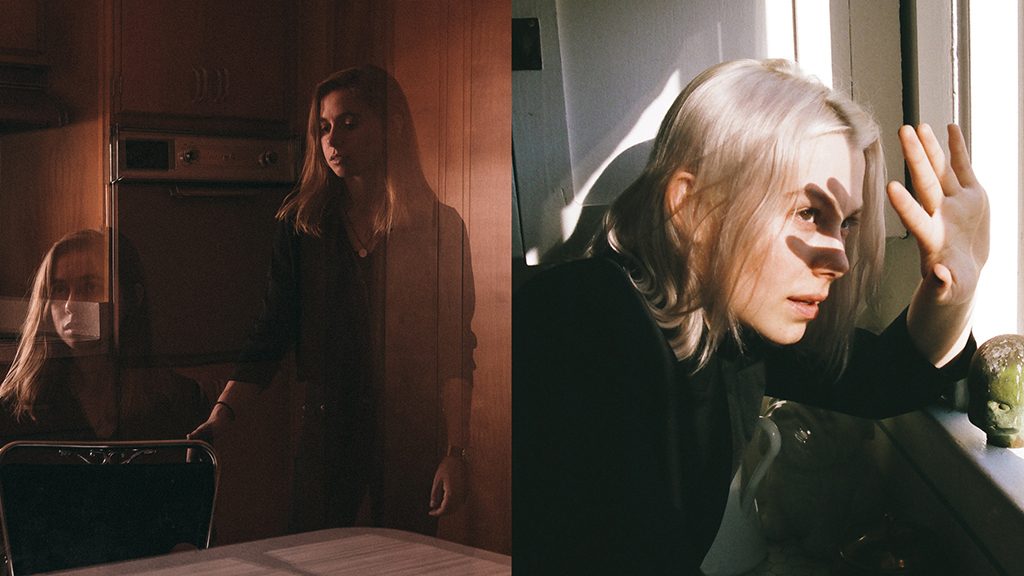
$29.50 – General Admission Floor
$29.50 – Reserved Balcony
*plus applicable service fees
Tickets are also available service charge free at The Fox Theater’s Box Office (located on the 19th street side of the theater) on show dates and on Fridays from noon – 7:00pm.
For an additional $50.00, you can opt in to upgrade your experience to include access to the exclusive Telegraph Room before, during and after the show!
Join us at The Den one hour before doors for food & drinks!
All doors & show times subject to change.
boygenius
The rumors are true: boygenius, the band of Julien Baker, Phoebe Bridgers, and Lucy Dacus will release their self-titled EP debut on November 9th on Matador Records. This illustrious trio is comprised of the most exciting and visionary young songwriters in independent rock, whose critically acclaimed albums were all released in the past year (Turn Out The Lights, Stranger In The Alps, and Historian, respectively).
Baker, Bridgers, and Dacus formed boygenius after booking a tour together, but the trio had subconsciously been in the works for longer than that. Through a series of tours and performances together, and chance encounters that led to friendships – including Bridgers’ and Dacus’ first in-person meeting backstage at a Philadelphia festival, greenroom hangouts that felt instantly comfortable and compatible, a couple of long email chains and even a secret handshake between Baker and Dacus – the lyrically and musically arresting singer-songwriters and kindred spirits got to know each other on their own terms.
With gut-wrenchingly personal yet easily relatable verses and spare, lilting melodic arrangements, all three are leading a new rock vanguard that values unflinching self-awareness and unassailable songcraft. Baker’s sophomore LP Turn On the Lights and Bridgers’ debut Stranger in the Alps swept best-of-2017 lists, while Dacus’ meditation on loss, Historian, has already become one of 2018’s most lauded releases.
Julien Baker
‘Little Oblivions’ is Julien Baker’s third album and follow-up to 2017’s ‘Turn Out The Lights’, both on Matador Records. The New York Times said the ‘Turn Out The Lights’ is “the work of a songwriter who has resonated with an international audience (…), the rare second album that, despite new self-consciousness, stretches beyond an unspoiled debut to reach for even bigger things, with all its passion intact”. The Sunday Times said “the mix of detached vocals, lush arrangements and laid-bare post-mortems on love, loss, dysfunction and acceptance is devastating.”
In 2018, Baker formed boygenius with Phoebe Bridgers and Lucy Dacus. The resulting eponymous EP and joint North American tour made for one of the most celebrated and talked about musical communions of that year, highlighting Baker at the forefront of a burgeoning generation of era-defining artists.
Baker shot to worldwide attention in 2015 with show-stopping debut, Sprained Ankle. Recorded in only a few days, it was a bleak yet hopeful meditation on identity, addiction, faith, resilience and redemption. An intense and immersive performer, her live shows were described by The New Yorker as “…. hushed, reverential. The only sounds you hear between songs are her fingers as she tweaks the tuning on her electric guitar, scattered whispers between friends, and the rustling as the crowd waits patiently for Baker to start strumming again”.
Baker has collaborated on studio recordings with Frightened Rabbit, Matt Berninger, Hayley Williams, Becca Mancari, Mary Lambert, and on stage with Justin Vernon, The National, Sharon Van Etten, Ben Gibbard, and others.
Phoebe Bridgers
“Yesterday, Tomorrow.”
The house is exactly what you’d expect: practically a studio apartment except it stands on its own, draped in honeysuckle and Dutchman’s pipe; a yard of dune sedge and stone. Her dog is buried in the garden along the eastern wall; sometimes, she wonders if the ground will bloom half-a-dozen of him under a certain kind of moon. In the morning the light creeps sideways through the windows and lights her up from the chest down, her head nestled in the shadow. Sometimes she finds herself playing guitar before she has left sleep. Her hands strum but her mind is still dreaming. (It’s her birthday, she’s at the movies, the screen is a tidal wave, someone touches her leg, she wakes up with her fingers tangled in the strings and the kettle whistling.)
The house is haunted. It should go without saying, but it should be said anyway. The house is haunted, but no one knows anything about the ghost or how it messes with you, except for the fact that every time she goes away (to Texas, to Memphis, to Graceland, to Germany) she always ends up coming home again. It’s the strangest kind of haunting. Everyone calls it, the house, the House of Punishment—more than one mistaken citizen has turned up looking for a similarly-named erotic dungeon on the other side of town—but the name is misleading. It is not a house where someone was punished, or a house where someone might be punished, but a house that replaces punishment; instead of feeling guilt or regret you must play quietly in any corner, and eventually the emotion will resolve itself.
Inside, every door frame is notched: the respective growths of former tenants, friends. On one of them, a place where—deep in her cups—she’d measured her height as a full five inches taller than normal; only the next morning did she realize, cotton-mouthed, that she’d been standing on her toes when she’d slid the pencil over the apex of her skull. There had been a Murphy bed once, she was certain, and sometimes when she was very, very tired she would imagine her bed, which was not a Murphy bed, snapping her up into the wall. Next to her bed, in her nightstand drawer, lived the following things: crumpled receipts, red yarn, eight dollars, a white lighter, two undeveloped film cameras, Grether’s Pastilles in their old-timey tin, fistfuls of birthday cards with the shimmer worn off, a pocket-sized copy of the constitution, a pocket knife, a pair of swimming goggles, a pair of recording headphones, shoelaces twisted into a Gordian knot, an unpaid parking ticket, a strip of Peanuts Halloween stickers, an MRI request form from when she sprained her finger, colloidal silver (someone told her it would cure her cold; someone else told her it would give her Argyria), a map of Kyoto (she’d gotten bored at the temple), incense, her first fan letter (she promised herself she’d respond; she never did), a bunch of bolts, a plastic doll’s hand, doggie bags (he’d died over a year ago), an unopened Replacements cassette, an unopened 23 & Me kit, an unopened fortune cookie, unopened pepper spray she doesn’t trust herself to take out of the packaging. In a fake book on her desk—pleather-bound and conspicuously absent a title—she collects her used boarding passes, old concert tickets, disconnected wristbands. It doesn’t escape her notice that she can’t throw anything away, that objects remain unopened, unresolved, untangled, unconsumed. She is always in the middle. She is never at the end of anything.
She lives near a hospital. All night, she hears sirens, imagines the people being transported to and fro, their bodies speeding along in the back of ambulances and their spirit trying to catch up. She makes jokes. “If I wake up, someone better be dying,” she says, until one night she wakes up and feels it: someone’s essence slipping past her on the way to somewhere else. After that, she thinks about the hospital as a metaphor, and considers the many ailments the metaphorical hospital could cure, the many symptoms it could treat: Imposter syndrome. Cabin fever. Foot-in-mouth disease. Word vomit.
She invites her friends—that is to say, her family—over for dinner. She has this one friend whose dad was really obsessed with blood—blood as in family, not the interesting kind of blood—and how it was thicker than water (ew), and then one day her friend looked up the actual expression and it was, The blood of the covenant is thicker than the water of the womb. Shit, right? Anyway, she makes a green bean casserole, which is demolished in short order, and hot rolls. Someone kills a pint of ice cream she’s been saving. Someone else drinks a beer so hard it sputters, erupts. Someone else sits in the corner playing cat’s cradle, waiting to feel the guilt lift from their sternum.
After that, the coven of her covenant goes out beneath the new moon; they journal and play Bright Eyes and Britney Spears and act out María Irene Fornés’ plays and eat peaches. They lie on the grass and the stone and talk about the skies they were born under. They don’t believe, really, that it makes a difference, but it’s nice to think about. After all, everyone knows the world is ending. They’ve been told as much, and they can see it in the streets, and they know the world is irreparably fucked, but most importantly they feel it among themselves; they know this goodness cannot last forever.
She sits near them. They are together but at the same time they are alone, as we all are. Someone has put a braid into her hair; she’s left toothmarks on someone else. Something moves through the empty house, less the ghost than the breath of the ghost. She tells her friends: “I’m not afraid to disappear.” Someone laughs. Then, someone else opens their mouth, and something else climbs out.
Carmen Maria Machado, March 2020
Lucy Dacus
Lucy Dacus is a musician, performer, storyteller, and widely regarded as “one of the best songwriters of her generation” (Rolling Stone). She has released three full-length albums under her name: 2016’s No Burden, 2018’s Historian, and 2021’s Home Video, as well as the boygenius album in 2018 with her bandmates Phoebe Bridgers and Julien Baker. Home Video was named a top 10 album of 2021 by NPR Music, SPIN, USA Today, Rolling Stone, The New York Times, and many more, leading to performances on The Tonight Show Starring Jimmy Fallon, The Late Show with Stephen Colbert, Jimmy Kimmel Live!, CBS This Morning, and Late Night with Seth Meyers. Additionally, Dacus made her Austin City Limits TV debut in 2020.
